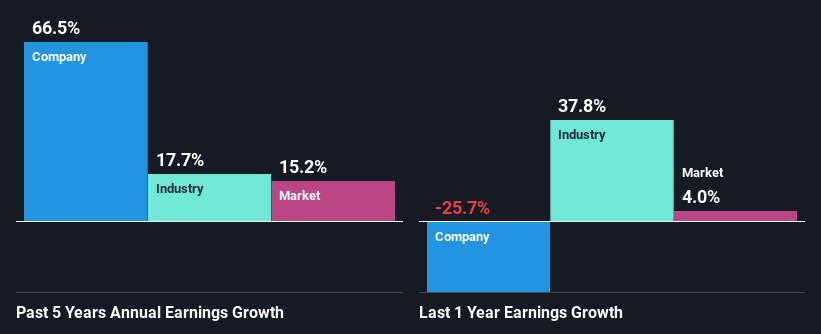Do Fundamentals Have Any Role To Play In Driving Alpine Income Property Trust, Inc.'s (NYSE:PINE) Stock Up Recently?
Most readers would already know that Alpine Income Property Trust's (NYSE:PINE) stock increased by 7.6% over the past three months. As most would know, long-term fundamentals have a strong correlation with market price movements, so we decided to look at the company's key financial indicators today to determine if they have any role to play in the recent price movement. Specifically, we decided to study Alpine Income Property Trust's ROE in this article.
Return on equity or ROE is an important factor to be considered by a shareholder because it tells them how effectively their capital is being reinvested. In simpler terms, it measures the profitability of a company in relation to shareholder's equity.
View our latest analysis for Alpine Income Property Trust
How Do You Calculate Return On Equity?
The formula for ROE is:
Return on Equity = Net Profit (from continuing operations) ÷ Shareholders' Equity
So, based on the above formula, the ROE for Alpine Income Property Trust is:
6.7% = US$21m ÷ US$304m (Based on the trailing twelve months to June 2023).
The 'return' is the income the business earned over the last year. One way to conceptualize this is that for each $1 of shareholders' capital it has, the company made $0.07 in profit.
What Is The Relationship Between ROE And Earnings Growth?
So far, we've learned that ROE is a measure of a company's profitability. Depending on how much of these profits the company reinvests or "retains", and how effectively it does so, we are then able to assess a company’s earnings growth potential. Assuming everything else remains unchanged, the higher the ROE and profit retention, the higher the growth rate of a company compared to companies that don't necessarily bear these characteristics.
Alpine Income Property Trust's Earnings Growth And 6.7% ROE
On the face of it, Alpine Income Property Trust's ROE is not much to talk about. Yet, a closer study shows that the company's ROE is similar to the industry average of 5.8%. Particularly, the exceptional 66% net income growth seen by Alpine Income Property Trust over the past five years is pretty remarkable. Considering the moderately low ROE, it is quite possible that there might be some other aspects that are positively influencing the company's earnings growth. For instance, the company has a low payout ratio or is being managed efficiently.
As a next step, we compared Alpine Income Property Trust's net income growth with the industry, and pleasingly, we found that the growth seen by the company is higher than the average industry growth of 18%.
Earnings growth is a huge factor in stock valuation. The investor should try to establish if the expected growth or decline in earnings, whichever the case may be, is priced in. Doing so will help them establish if the stock's future looks promising or ominous. What is PINE worth today? The intrinsic value infographic in our free research report helps visualize whether PINE is currently mispriced by the market.
Is Alpine Income Property Trust Making Efficient Use Of Its Profits?
Alpine Income Property Trust seems to be paying out most of its income as dividends judging by its three-year median payout ratio of 57%, meaning the company retains only 43% of its income. However, this is typical for REITs as they are often required by law to distribute most of their earnings. Despite this, the company's earnings have grown significantly as we saw above.
Moreover, Alpine Income Property Trust is determined to keep sharing its profits with shareholders which we infer from its long history of four years of paying a dividend.
Conclusion
In total, it does look like Alpine Income Property Trust has some positive aspects to its business. While no doubt its earnings growth is pretty substantial, we do feel that the reinvestment rate is pretty low, meaning, the earnings growth number could have been significantly higher had the company been retaining more of its profits. That being so, according to the latest industry analyst forecasts, the company's earnings are expected to shrink in the future. Are these analysts expectations based on the broad expectations for the industry, or on the company's fundamentals? Click here to be taken to our analyst's forecasts page for the company.
Have feedback on this article? Concerned about the content? Get in touch with us directly. Alternatively, email editorial-team (at) simplywallst.com.
This article by Simply Wall St is general in nature. We provide commentary based on historical data and analyst forecasts only using an unbiased methodology and our articles are not intended to be financial advice. It does not constitute a recommendation to buy or sell any stock, and does not take account of your objectives, or your financial situation. We aim to bring you long-term focused analysis driven by fundamental data. Note that our analysis may not factor in the latest price-sensitive company announcements or qualitative material. Simply Wall St has no position in any stocks mentioned.

 Yahoo Movies
Yahoo Movies 

